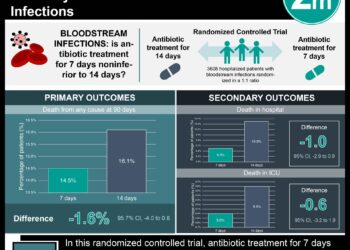Delayed antibiotic prescribing is a safe and effective for respiratory tract infections in a community setting
1. There was no difference in follow-up symptom severity between patients who received immediate or delayed antibiotics for respiratory tract infections.
2. Delaying antibiotics was associated with higher patient satisfaction, lower complications, and fewer reconsultations compared to not receiving any antibiotics.
Evidence Rating Level: 1 (Excellent)
Study Rundown: In 2016, the CDC estimated that 30% of antibiotics prescribed in the US were unnecessary. This is especially a concern for upper respiratory tract infections, where evidence around antibiotic use remains controversial. Delayed prescribing, or waiting to fill the prescription after initial consultation, is a potential strategy to lower the risk of antibiotic resistance and unnecessary drug side effects. In this systematic review and individual patient data meta-analysis, the effect of delayed prescribing on symptom severity in respiratory infections was studied. Nine RCTs and four observational studies were included in the individual patient data meta-analysis, most of which were in the context of primary care. Based on a 7-point scale taken two to four days after initial consultation, no difference was found in follow-up symptom severity between delayed versus immediate antibiotics or between delayed versus no antibiotics. Secondary outcomes included a slightly longer disease duration for the delayed group versus the immediate group. Recorded hospital admissions and deaths were lower in the delayed versus comparison groups. There were also significantly lower reconsultation rates and increased patient satisfaction in the delayed versus no antibiotic group. The study adjusted the data for duration of previous illness, fever, comorbidity and severity and found no change in effectiveness. However, age had a significant effect on the results, with children younger than five having more severe symptoms with delayed versus immediate antibiotics. Limitations of this study include its lack of external validity to a non-primary care practice, for example in severe ICU cases with sepsis. Nonetheless, this review provides strong evidence that delayed prescribing is a safe strategy for mitigating antibiotic overuse in a community setting, except in children under five years of age.
Click to read the study in BMJ
Relevant Reading: Understanding the delayed prescribing of antibiotics for respiratory tract infection in primary care: a qualitative analysis
In-Depth [systematic review and meta-analysis]: In this study, data was collected from nine RCTs and four observational studies, totaling 55 682 patients, mostly in a primary care setting. Aggregate data from five RCTs (n = 930) that did not have individual patient data was also included. The mean age was 38.7 years and subgroup effects, such as fever, age, duration of previous illness, lung disease, and baseline severity were also analyzed. A two-stage approach was used to classify the symptom severity on a seven-point scale (normal to as bad as could be). Adjusted data from eight studies showed no difference in follow-up symptom severity between delayed versus immediate antibiotics (adjusted mean difference -0.003, 95% CI -0.12 to 0.11). Adjusted data from seven studies showed no difference in symptom severity between delayed versus no antibiotics (adjusted mean difference 0.02, 95% CI -0.11 to 0.15). Subgroup analysis showed that age had a significant effect on the results, as children younger than five had more severe symptoms with delayed antibiotics versus immediate (adjusted mean difference 0.10, 95% CI 0.03 to 0.18). Secondary outcomes included slightly longer symptom duration in delayed versus immediate (11.4 vs. 10.9 days). For delayed antibiotics versus no antibiotics, there were lower reconsultation rates (odds ratio [OR] 0.72, 95% CI 0.60 to 0.87), fewer complications leading to hospital admission or death (OR 0.62, 95% CI 0.30 to 1.27), and higher patient satisfaction.
Image: PD
©2021 2 Minute Medicine, Inc. All rights reserved. No works may be reproduced without expressed written consent from 2 Minute Medicine, Inc. Inquire about licensing here. No article should be construed as medical advice and is not intended as such by the authors or by 2 Minute Medicine, Inc.







